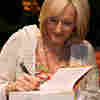
Rupert Grint, Emma Watson and Daniel Radcliffe attend the World Premiere of Harry Potter and The Deathly Hallows – Part 2 at Trafalgar Square on July 7, 2011 in London, England.
Ian Gavan/Getty Images
hide caption
toggle caption
Ian Gavan/Getty Images

Rupert Grint, Emma Watson and Daniel Radcliffe attend the World Premiere of Harry Potter and The Deathly Hallows – Part 2 at Trafalgar Square on July 7, 2011 in London, England.
Ian Gavan/Getty Images
Harry Potter fans have something big to look forward to in the new year. The cast and crew of the movies will be reuniting for a look back on the franchise. But one person you shouldn’t count on seeing? Author J.K. Rowling.
“Harry Potter 20th Anniversary: Return to Hogwarts” is being billed as a retrospective to celebrate the 20th anniversary of the first Harry Potter film’s release and is slated to hit HBO Max on New Year’s Day, the streaming service announced on Tuesday.
Director Christopher Columbus, who directed the first two Potter films, Daniel Radcliffe, Emma Watson, Rupert Grint and other actors from the eight films will gather for a journey back to Hogwarts to discuss the making of Harry Potter and the impact of the franchise, according to HBO Max. It will be the first time they’ve reunited for such a project since the final film premiered in 2011, the streaming service said.
However, while Rowling will be featured in archived footage, she will not be appearing for the special, a source close to the production confirmed to NPR. They did not comment on why Rowling will not appear or whether she was asked to participate and declined.

J.K. Rowling attends the U.K. premiere of “Fantastic Beasts: The Crimes Of Grindelwald” at Cineworld Leicester Square on November 13, 2018 in London, England.
John Phillips/Getty Images
hide caption
toggle caption
John Phillips/Getty Images

J.K. Rowling attends the U.K. premiere of “Fantastic Beasts: The Crimes Of Grindelwald” at Cineworld Leicester Square on November 13, 2018 in London, England.
John Phillips/Getty Images
Rowling has, in recent years, been the subject of controversy. In 2019, she drew condemnation for her tweets in support of Maya Forstater, a researcher whose transphobic statements cost her her job (though that decision was later successfully appealed). Rowling went on to defend her support of Forstater in an essay about gender, and her comments have divided the fanbase and alienated many readers.
Following Rowling’s comments, several actors from the Potter films spoke out in defense of trans people and to denounce Rowling’s actions. Radcliffe did so in an essay of his own; Watson shared her support for trans people on Twitter, and Grint spoke out in the U.K.’s Sunday Times and, later, in an interview with Esquire.
Rowling’s tweets have continued to stir controversy. Last year, her apparent mockery of gender-inclusive language used by a media outlet garnered more backlash.
